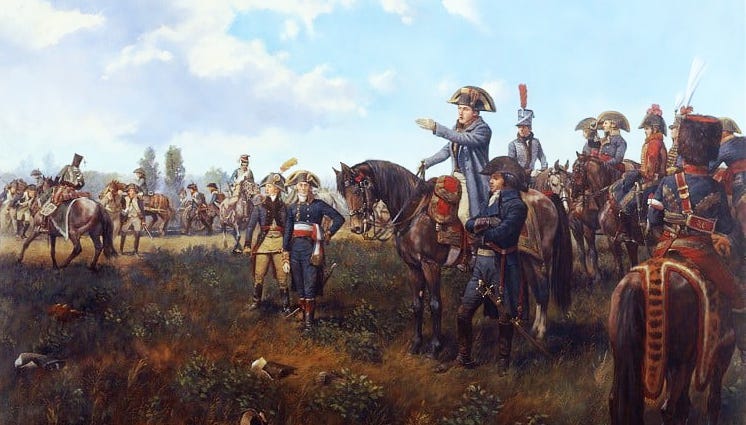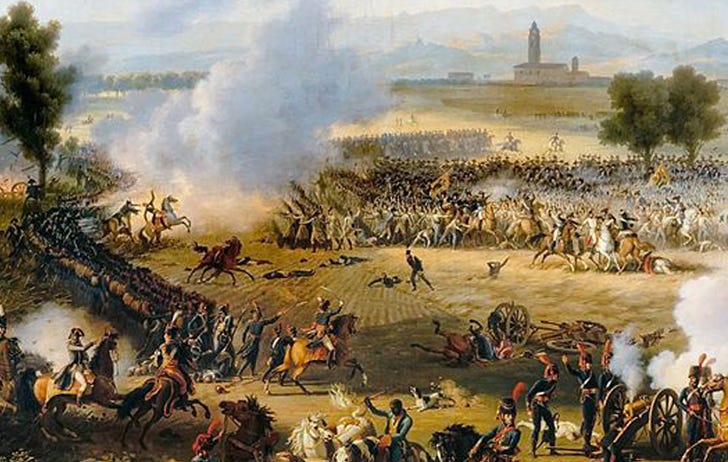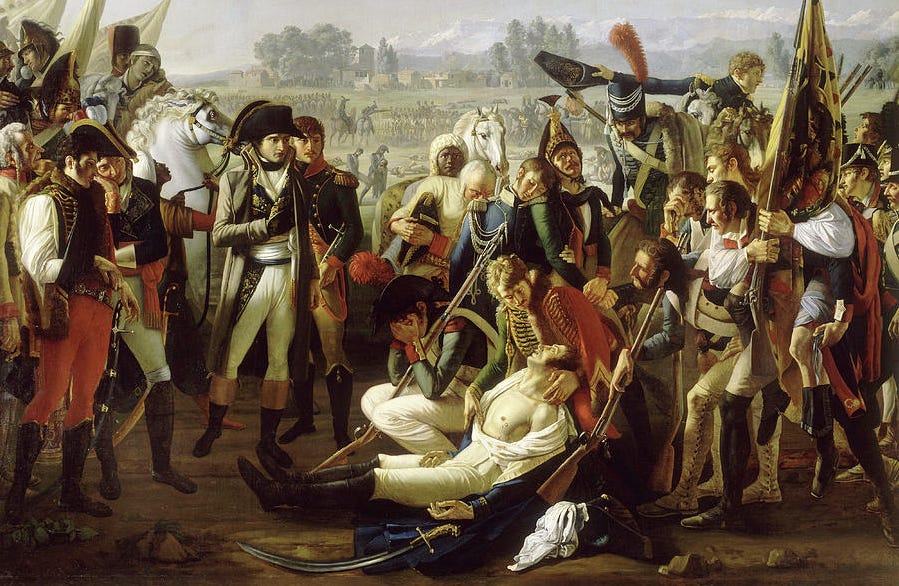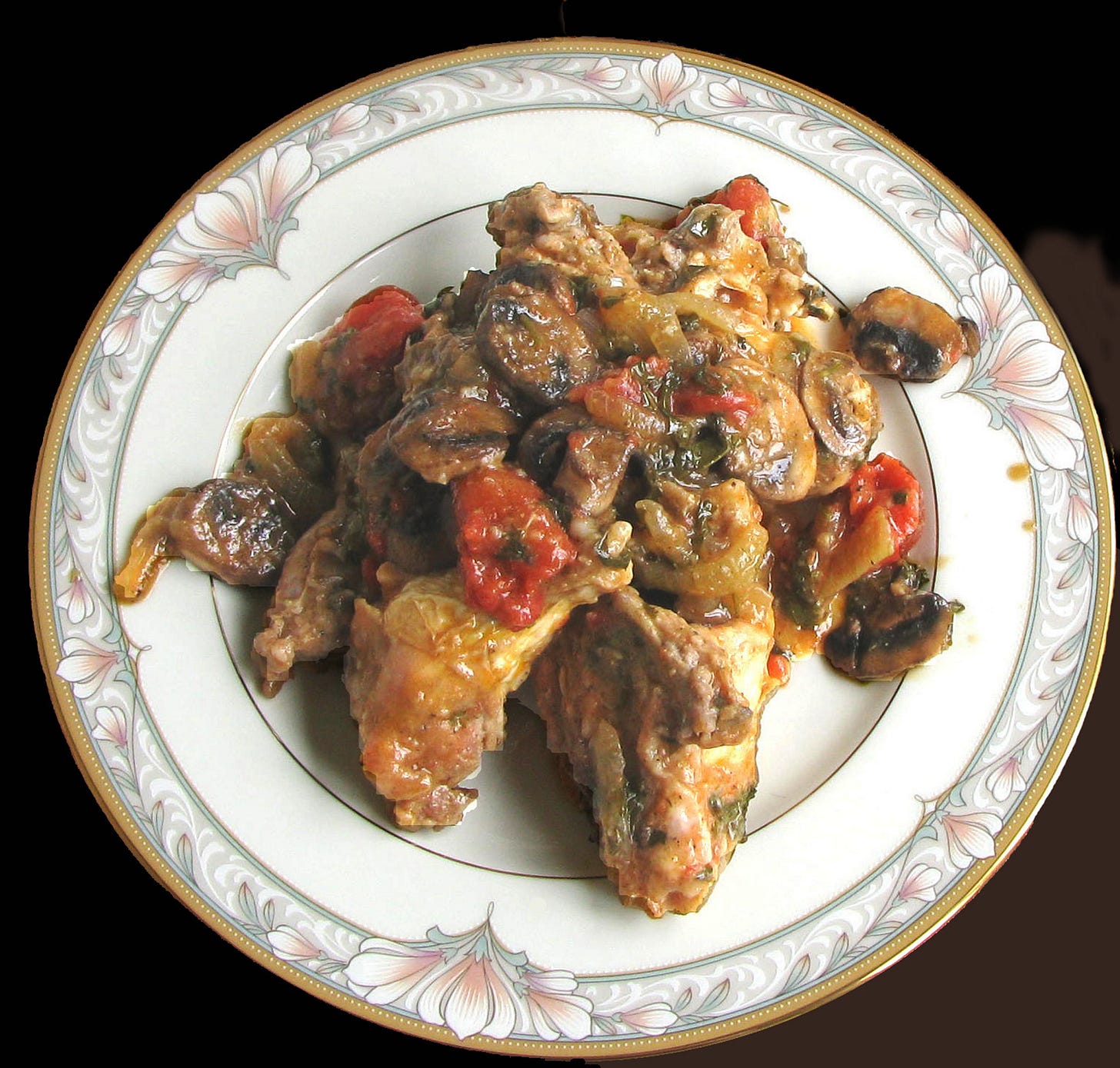
Say what you will about Napoleon, he was no slouch when it came to war and politics. His monumental ego didn’t get in the way of his overwhelming victories on the field of battle nor his success in bringing to the Nation of France a period of stability following the bloody and chaotic French Revolution. Whatever else may be said of him, Napoleon Bonaparte was a singular event in modern world history.
I was charmed as a boy by a little 3-inch brass bust of Napoleon which my grandmother kept on her dresser and which I now possess. Napoleon greatly admired George Washington, as did most Americans who also responded with affection for Napoleon, even to the extent that my great grandfather was given “Napoleon” as his middle name!
Marengo: Napoleon’s defeat of the Austrians
There actually were two battles of Marengo on July 14, 1800. Napoleon lost the first one by 3:00 in the afternoon and then won the second one by dusk. He had stretched his army too thin and the opposing Austrian army had overrun it. However, one of his top generals, Louis Desaix, famously told him: “This battle is completely lost but there is still time to win another one.”

Desaix then led a cavalry charge against the tired, battle-weary Austrians and soundly defeated them. Over 12,000 men on both sides were killed during the fighting on that single day. It was a huge loss for the Austrians and a stage-setting victory for Napoleon. General Desaix, also a personal friend of Napoleon, was killed in the charge which he led, gravely saddening Napoleon, who later would have Desaix’s name engraved into one of the stones of the Arch du Triomphe in Paris.

“Dunand, serve up immediately!”
Napoleon, who was famously superstitious, made it a point never to eat anything before or during a battle which meant that he was ravenous at the conclusion of one and this was the case at Marengo. He told his chef, Dunand, to rustle up a celebratory meal and be quick about it.
Alas, in the haste to engage the enemy, Dunand’s chuck wagon, with all the provisions and utensils, got left behind. And it was already getting dark. Dunand quickly rode away on horseback to surrounding farms where he foraged a chicken, a bottle of white wine, some tomatoes,a few mushrooms, eggs, basil, crawfish, even an iron skillet. He cut up the chicken with Napoleon’s sword and used brandy from the emperor’s personal flask to work up some culinary magic which he served to his boss. Napoleon loved it. He loved it so much that he ordered it to be served after every subsequent battle. And there were many battles during the Napoleonic Wars.

You Can Do This
In oil in a medium-hot skillet, fry a whole, cut up chicken, seasoned and coated in flour. Drain on paper towels and set aside.
Meanwhile, boil a bottle of white wine until it is reduced by half and swet this aside. Drain the oil from the skillet and add a tablespoon of olive oil.
Slice two onions, smash and chop 3 cloves of garlic, finely chop a handful each of fresh parsley and fresh basil, slice enough fresh mushrooms to equal 2 cups then add all tyhis to the skillet and fry on medium heat stirring until softened.
Add the reduced white wine.
Add three fresh tomatoes cut up.
Add 2 teaspoons of chicken base paste (I use “Better that Boullion”)
Add the browned chicken pieces.
Pour in a half-cup of good brandy.
Cover and simmer on low heat for 30 minutes.
Serve with a hot baguette.
Napoleon’s history has largely receded into the sands of time and become lost to current generations. We think of him mainly as a short, military sort of guy with an inferiority complex who crowned himself Emperor and lost the Battle of Waterloo to the Duke of Wellington.
But the truth is that Napoleon was 5-feet, 7-inches tall, average height for a male human at that time He won more battles than Alexander the Great. In the process of shaking up all of Europe, he also won more battles than Julius Caesar. Let that sink in before you dismiss Napoleon as second-rate. His impact in France and much of the rest of Europe was enormous, not least among reasons for which was his creation and subsequent enactment of France’s first Civil Code or “Napoleonic Code” in March, 1804.
This first Civil Code ensured the countrywide equality of all male citizens before the law, universal male suffrage, property rights and religious liberty while abolishing all feudal customs. An amazing, nation-changing feat.
Before that, most of France was a crazy quilt of local laws and a seemingly incurable mess. Incidentally, Louisiana adopted the “Code Napoleon” even before becoming a state in 1812. The legal system in that state still follows it. It was also Napoleon who sold Louisiana (the Louisiana Purchase) to President Thomas Jefferson in 1803 for $11 million.
“My glory is not that I won forty battles and dictated the law to kings. Waterloo wipes out the memory of all my victories. But what will be wiped out by nothing and will live forever is my Civil Code.”
NOTE: Below the paywall you will discover some little-known facts about Napoleon’s activities in Egypt and read his own words regarding his imprisonment by the British on the island of St. Helena. Paid subscriptions are the only way I have to keep publishing these posts every week. Thank you!
Keep reading with a 7-day free trial
Subscribe to Eat Your History to keep reading this post and get 7 days of free access to the full post archives.




